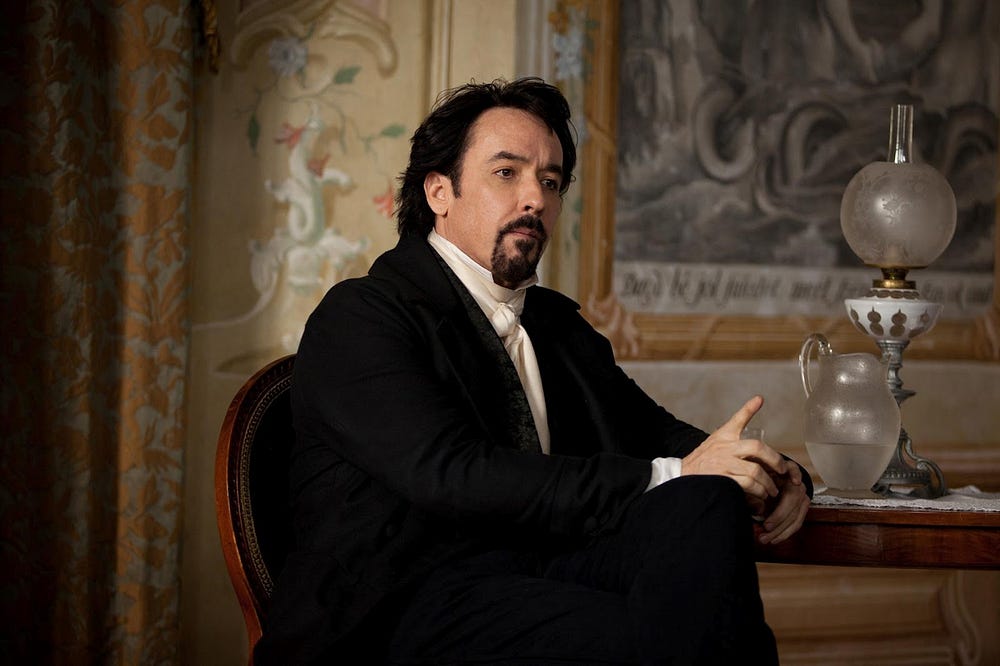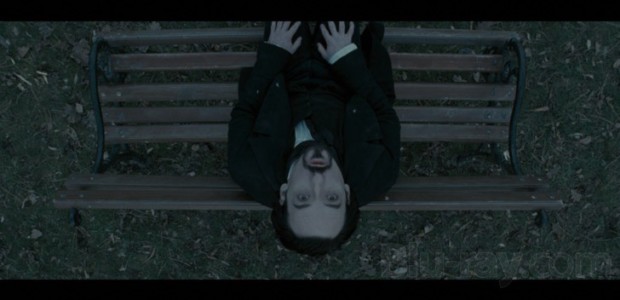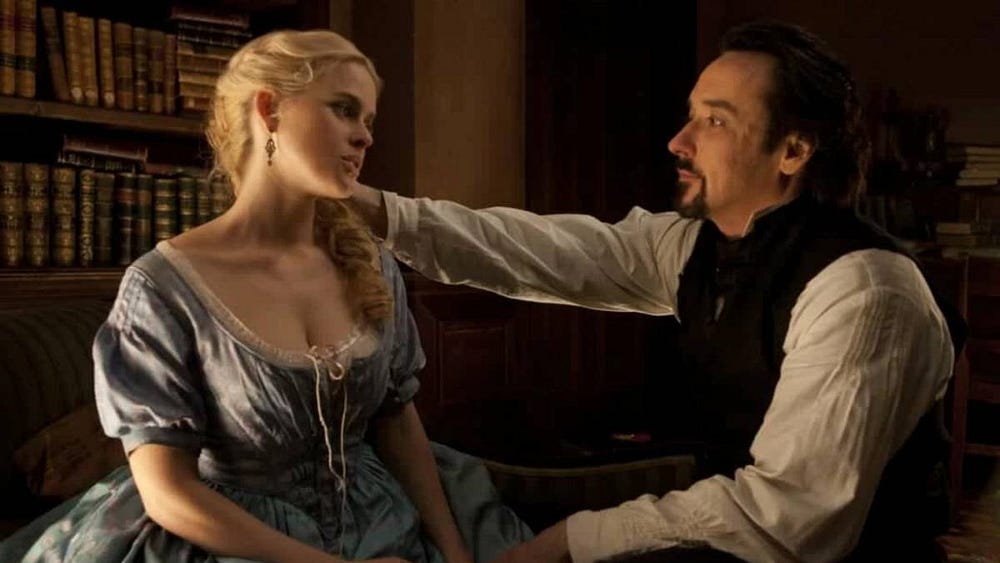The first horror story I remember being excited by was Edgar Allan Poe’s “Tell-Tale Heart”. While the other students in my class wore various masks of terror and disgust at the premise, I sat enthralled from the opening lines. Here was an unreliable narrator worth sinking your teeth into. None of that Holden Caulfield angst or Nick Carraway disillusionment with humanity here; just pure, unfiltered madness held together in a rickety sack of nerves in a vaguely human shape working desperately to convince you of its own sanity. I would not fully buy into a love for horror as a genre for years after that point, but I rabidly consumed Poe stories and adaptations from that moment on.
Poe is a staple of public-school curricula, especially if you, like me, lived in honors English classes or above. Naturally, as with all authors forced upon children’s developing minds, there are likely just as many people who left those classes bored of him. Poe’s prose is dense, after all, and easy to get lost in. He writes with a voice of his own but with language very much of his time—that is, the 1800s. Nevertheless, with the right adaptations on hand, anything can become accessible (I still wouldn’t be able to make head nor tail of The Canterbury Tales if it weren’t for these animated interpretations, introduced to me in high school and carried through college).
But his prose isn’t the only potential turn off. For all his genius, Poe was a deeply tragic and problematic figure. An argument can be made there, too, that he was a product of his time and marrying his 14-year-old cousin when he was 27 was run of the mill stuff, but even so such things put a bad taste in the mouth of modern audiences. Her death some short years after the marriage affected him so deeply that he began his spiral into alcoholism. As his best-known works are virtually inseparable from the figure of the tragically dead beautiful maiden, it seems morbidly fitting that the only verified image of Virginia Clemm Poe should be a portrait painted hours after her death.
Questionable relationship dynamics or no, Poe went on to become a touchstone of Gothic literature and is often credited as an originator of the detective genre and the first American writer to financially support himself on writing alone. Despite his success as a writer, his life was checkered with familial disappointment and death of those close to him at discomfortingly young ages, and his own death would eventually go ultimately unresolved and steeped in mystery and speculation (usually credited to either suicide or alcoholism).
While there have been plenty of popular adaptations of Poe’s work throughout the years, there are far fewer artistic interpretations of his life. Enter 2012’s THE RAVEN, directed by James McTeigue, written by Ben Livingston and Hannah Shakespeare, and bursting at the seams with references to the author’s life and work. Rather than placing him strictly in the mold of tragic Gothic figure, THE RAVEN allows Poe (played by John Cusack) the space to be a genius, scoundrel in love, and morally aggrieved detective in his own right when a madman starts modeling murders after his stories and the police seek Poe’s help to stop and solve them. Sprinkle in a (much more age-appropriate) love interest soon put in peril and you’ve got the perfect Poe platform. If he wants to save the love of his life, Poe must follow the clues and his own literary backlog to find her before her death.
I will admit, this deep dive into Poe took me a few watches to get into, though if you were to ask me why now I would blame it all on my own folly. It is, however, largely a visually and tonally dark endeavor, which might have had something to do with it. But it is clearly a labor of love and admiration for a deeply troubled man, and it shows with each new viewing. Plus, what delightful serendipity that it should be penned in part by someone with the last name of Shakespeare when Poe himself may have been named after King Lear’s own tragic hero, Edgar.
What gives this film its soul is not its gruesomely faithful imaginings of Poe’s most horrific ideas or even its “literature makes psychos more creative” bent a la SCREAM. No, what pushes it onward into successful originality is its dedication to depicting Poe as a man of heart and hurt, capable of love and compassion amid a world and a narrative that would have him cast aside as a madman of poisoned mind. He is perhaps the most horrified that someone would use his works as inspiration for ending human life of anyone in the film, and frequently passionately argues that dark imaginary thoughts do not in fact make one a violent person capable of such acts as they think up.
Poe is not Poe here as any of us learned in school. Here he is Edgar, deeply in love with Emily (Alice Eve) and desperate to stop the man he has inspired. The film makes no effort to erase his tragic history or destructive tendencies—his wife has died, and he still drinks heavily, even more so under the extreme stress of finding his new love in peril—but rather gives him a chance to grow from it and toward a brighter light. In theory.
In truth, the premise of the film is that it takes place over the course of the last days of his life. As such it becomes more a chance to grasp for those bright moments of life even as they continue to be consumed by the darkness of the city and the minds around him. In one delightful moment just before he is enlisted to help the police solve the series of murders, he is leading a poetry workshop and critiquing a woman’s ode about a bumblebee during which he offers an interpretation of a line as anti-capitalist, cog in the machine, soul-crushing brilliance. It’s one of THE RAVEN’s lighter moments, both painting him as encouraging of the art form in anyone’s hands and instantly recognizable as the kind of statement that would have catapulted any of us to the top of any high school English class.

THE RAVEN‘s dual interest in exploring the idea of Poe’s most graphic imaginings made flesh and exploring his humanity with compassion makes it a must-watch for any horror fan with an interest in the Gothic, where such lines are toed with lifeblood like regularity. It creates a space that both caters to and criticizes the audience. It knows the gruesome murders are what we come to see when we hear the name “Poe”, and it provides—so long as we can accept a healthy scolding from the man himself. Rather than parody or melodramatic spoof, it dissects the cliché of tortured-writer-as-dark-figure and in its place presents a man firmly planted in the space between reality and imagination, and aware of the limitations of each.
Perhaps best of all, it gives Poe’s death a sense of dignity not often assigned to it. Where most would credit his demise to alcoholism and mania, THE RAVEN posits a world in which it was the result of an act of love. As in real life, he babbles and raves on a park bench, muttering, in this case, the name “Reynolds” …only this time his raving saves his love. No more beautiful young women in his life dying at the hands of preventable tragic circumstances. His sacrifice ends the cycle of his poetic mourning, allowing the brightest thing he has in the film to go on shining.
Poe’s death may never be solved—even his death certificate has been lost—but isn’t it great that, even if only in fiction, it was not at the hands of a battle with demons, but an act rooted in that state of dedicated love beyond death he grew to know and imagine so well? That he should be able to save even one maiden, rather than mourn her as she sinks by the sea or torments his heart through the continued calls of horror’s favorite bird?
Tags: Ben Livingston, Brendan Coyle, Brendan Gleeson, Cask of Amontillado, Edgar Allan Poe, Hannah Shakespeare, James McTeigue, Jimmy Yuill, John Cusack, John Warnaby, Kevin McNally, Luke Evans, Oliver Jackson-Cohen, Pam Ferris, Pit and the Pendulum, Raven, Relativity Media, Sam Hazeldine, Tell-Tale Heart, The Raven, Universal Pictures




No Comments